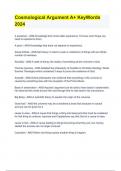A posteriori - Study guides, Class notes & Summaries
Looking for the best study guides, study notes and summaries about A posteriori? On this page you'll find 152 study documents about A posteriori.
Page 3 out of 152 results
Sort by
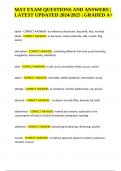
-
MAT EXAM QUESTIONS AND ANSWERS | LATEST UPDATED 2024/2025 | GRADED A+
- Exam (elaborations) • 69 pages • 2024
-
- $15.49
- + learn more
abash - CORRECT ANSWERS to embarras (disconcert, discomfit, faze, mortify) abate - CORRECT ANSWERS to decrease, reduce (dwindle, ebb, recede, flag, wane) aberration - CORRECT ANSWERS something different from the usual (anomaly, irregularity, abnormality, deviation) abet - CORRECT ANSWERS to aid, act as accomplice (help, succor, assist) abject - CORRECT ANSWERS miserable, pititful (pathetic, lamentable, sorry) abridge - CORRECT ANSWERS to condense, shorten (abbreviate, cut, prune) abscond...
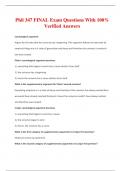
-
Phil 347 FINAL Exam Questions With 100% Verified Answers
- Exam (elaborations) • 11 pages • 2024
- Available in package deal
-
- $12.49
- + learn more
Phil 347 FINAL Exam Questions With 100% Verified Answers Cosmological argument Argues for the idea that the universe has a beginning. This argument follows the idea that all empirical things are in a state of generation and decay and therefore the universe is material and was created. Plato's cosmological argument premises 1.) everything that begins to exists has a cause distinct from itself 2.) the universe has a beginning 3.) hence the universe has a cause distinct from itself What ...
A posteriori - ANS-Knowledge that comes after experience. To know such things you need to experience them.
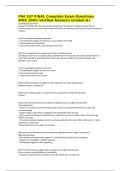
-
Phil 347 FINAL Complete Exam Questions With 100% Verified Answers Graded A+
- Exam (elaborations) • 6 pages • 2024
-
- $10.39
- + learn more
Phil 347 FINAL Complete Exam Questions With 100% Verified Answers Graded A+ Cosmological argument Argues for the idea that the universe has a beginning. This argument follows the idea that all empirical things are in a state of generation and decay and therefore the universe is material and was created. Plato's cosmological argument premises 1.) everything that begins to exists has a cause distinct from itself 2.) the universe has a beginning 3.) hence the universe has a cause distinc...
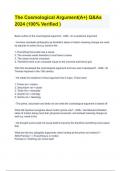
-
The Cosmological Argument(A+) Q&As 2024 (100% Verified )
- Exam (elaborations) • 4 pages • 2024
-
- $7.49
- + learn more
Basic outline of the cosmological argument - ANS-- An a posteriori argument - Involves scholastic philosophy as Aristotle's ideas of motion meaning change are used by aquinas in prima via e.g. wood to fire 1. Everything that exists has a cause 2. The universe exists therefore it must have a cause 3. The cause must be uncaused 4. Therefore there is an uncaused cause to the universe and that is god
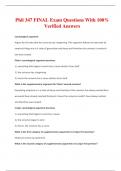
-
Phil 347 FINAL Exam Questions With 100% Verified Answers
- Exam (elaborations) • 11 pages • 2024
- Available in package deal
-
- $12.49
- + learn more
Phil 347 FINAL Exam Questions With 100% Verified Answers Cosmological argument Argues for the idea that the universe has a beginning. This argument follows the idea that all empirical things are in a state of generation and decay and therefore the universe is material and was created. Plato's cosmological argument premises 1.) everything that begins to exists has a cause distinct from itself 2.) the universe has a beginning 3.) hence the universe has a cause distinct from itself What ...
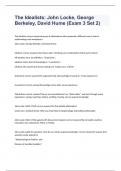
-
The Idealists: John Locke, George Berkeley, David Hume (Exam 3 Set 2) with correct answers
- Exam (elaborations) • 7 pages • 2023
-
Available in package deal
-
- $13.99
- + learn more
The Idealists correct answersA group of philosophers who proposed a different way to look at epistemology and metaphysics. John Locke, George Berkeley, and David Hume. Idealism correct answersIs the theory that *All things are constituted by Mind and it's Ideas*. All Idealists were, by definition, *Empiricists*. Idealism claims that all knowledge is *a posteriori*. Idealism also asserts that human beings are "tabula rasa" at birth. Empiricists correct answersThe argument that all kn...
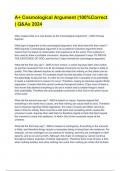
-
A+ Cosmological Argument (100%Correct ) Q&As 2024
- Exam (elaborations) • 4 pages • 2024
-
- $7.49
- + learn more
Who created what is is now known as the Cosmological Argument? - ANS-Thomas Aquinas What type of argument is the cosmological argument, and what does this then mean? - ANS-Aquinas' Cosmological argument is an a posteriori inductive argument which means that it is based on observation and experience of the world. This evidence is then used to draw a probable conclusion. Aquinas then proposed 5 ways TO PROVE THE EXISTENCE OF GOD, and the first 3 ways formed the cosmological argument.
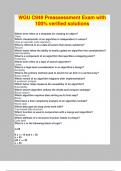
-
WGU C949 Preassessment Exam with 100% verified solutions
- Exam (elaborations) • 5 pages • 2024
-
- $10.49
- + learn more
WGU C949 Preassessment Exam with 100% verified solutions Which term refers to a template for creating an object? Class Which characteristic of an algorithm is independent in nature? Uses an agnostic code repository What is referred to as a data structure that stores subitems? Record Which factor takes the ability to easily update an algorithm into consideration? Maintainability What is a component of an algorithm that specifies a stopping point? Finiteness Which term refers to a type...
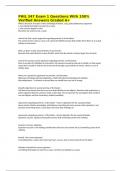
-
PHIL 347 Exam 1 Questions With 100% Verified Answers Graded A+
- Exam (elaborations) • 2 pages • 2024
-
- $10.39
- + learn more
PHIL 347 Exam 1 Questions With 100% Verified Answers Graded A+ What is the basic structure of the cosmological (kalam, craig, plato-philoponus) argument 1. Everything that begins to exist has a cause 2. the universe began to exist therefore the universe has a cause what is the first a priori argument regarding premise 2 of the Kalam The universe has to have a cause as it cannot be infinite because that implies there there is an actual infinity of real events Why can there not be a...

Study stress? For sellers on Stuvia, these are actually golden times. KA-CHING! Earn from your study resources too and start uploading now. Discover all about earning on Stuvia

